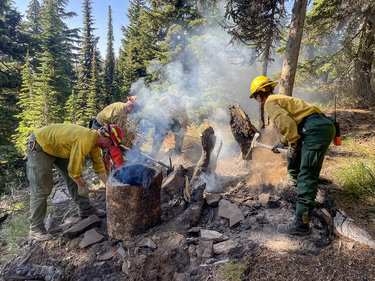State launches burn ban as drought continues
— Photo from NYSDEC
DEC forest rangers have safely returned after two-week assignments fighting wildland fires in Montana, Washington, and Idaho — pictured here. The East and Mire fires in Idaho, which were caused by lightning, have burned more than 3,600 acres of the Nez Perce-Clearwater National Forests.
ALBANY COUNTY — A statewide burn ban, which started on Oct. 2, will be revaluated before it expires on Oct. 15.
On Oct. 2, the Southern Tier, the Lake Ontario Plains, and the Adirondacks were listed as having “high” fire danger while fire danger in the rest of the state, including Albany County, was mapped as “moderate.”
A high fire danger means all fine, dead fuels ignite readily and fires start easily from most causes, including unattended brush and campfires. A moderate fire danger means fires can start from most accidental causes.
In the last two months, forest rangers have responded to 64 wildland fires across the state, according to the Department of Environmental Conservation which says, “Fires may become serious and controlling them difficult unless attacked successfully while still small.”
“An unusually dry period” combined with the danger of fallen leaves accumulating led to the ban, according to a proclamation signed by the governor.
The ban prohibits outdoor fires for disposal of brush or debris as well as all uncontained fires, including campfires, and open fires used for cooking.
Backyard fire pits and contained campfires less than three feet in height and four feet in length, width, or diameter are allowed, as are small, contained cooking fires.
Burning garbage or leaves is already prohibited year-round in New York state and several municipalities have burn bans currently in effect, according to a release from the governor’s office.
At the same time, a wide swath of New York running through the center of the state, including Albany County, is under a “drought watch” while the North Country and four counties bordering Pennsylvania — Cattaraugus, Allegheny, Steuben, and Chemung — are under a more severe “drought warning.” Just New York City and Westchester county are mapped as “normal.”
The state has four levels of drought advisories: watch, warning, emergency, and disaster.
There are no mandatory use restrictions under a drought watch but “residents are strongly encouraged to voluntarily conserve water,” according to the DEC.
The high fire danger, the DEC says, is due in part to gusty winds and lower relative humidities forecasted during an existing prolonged dry spell. “Any notable rainfall from last week was not areawide and while wind gusts are expected to calm down,” it says, “dry conditions are expected to continue for at least another week.”
Lack of rain affects terrestrial plants and animals, stunting growth, the DEC notes, and drought conditions may be a contributing factor to Harmful Algae Bloom (HAB) formation. The DEC maintains a HABs Reporting and Notifications page of waterbodies that currently have blooms.
Farmers with water-supply issues are encouraged to contact their local Soil and Water Conservation Districts. The Cornell Cooperative Extension Disaster Education Network and the New York State Department of Agriculture and Markets offer additional resources and local support.
The state is encouraging all residents, including those dependent on private groundwater wells, to conserve water whenever possible during the coming weeks and offers this advice to reduce water use:
— Water lawns only when necessary, choose watering methods that avoid waste, and water in the early morning to reduce evaporation and maximize soil hydration;
— Reuse water collected in rain barrels, dehumidifiers, or air-conditioners to water plants;
— Raise lawn-mower cutting heights. Longer grass is healthier with stronger roots and needs less water;
— Use a broom, not a hose, to clean driveways and sidewalks;
— Fix leaking pipes, hoses, and faucets;
— Wash only full loads of dishes and laundry;
— Take shorter showers or fill the bathtub partly;
— Install water-saving plumbing fixtures;
— Don’t run the tap to make water hot or cold; and
— Wash cars less frequently.



